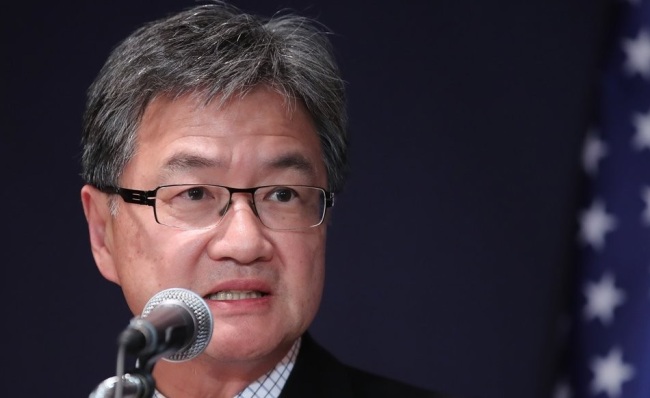The top US envoy on North Korea will visit South Korea this week to hold a meeting with his South Korean counterpart, a diplomatic source here said Monday.

US Special Representative for North Korea Policy Joseph Yun (Yonhap)
Joseph Yun will meet with Lee Do-hoon, the special representative for peace and security affairs on the Korean Peninsula, to discuss the security situation here, including North Korean nuclear issues, while attending events hosted by the US Embassy in Seoul. Coupled with security issues, talks of the possible establishment of a direct US-North Korea dialogue channel are expected to be on the agenda.
Yun’s visit closely follows US President Donald Trump’s state visit here last week, where he addressed North Korea’s nuclear ambitions and its threats to regional security. It also comes amid a near two-month hiatus in the North’s military provocations.
Although Trump vocally criticized the North last week in Seoul, a shift in his tone to a softer rhetoric was evident, hinting that Washington may be ready to begin a more peaceful negotiation with North Korea.
“I really believe that it makes sense for North Korea to come to the table and to make a deal that’s good for the people of North Korea and the people of the world,” Trump said in Seoul.
“I do see certain movement, yes. But let’s see what happens.”
Regarding North Korea’s current pause in nuclear and missile tests, Yun reportedly told the US Council on Foreign Relations on Oct. 30 that if North Korea halts such experiments for around 60 days, it would be a signal indicating the need to resume direct talks with Pyongyang.
Last month, US Secretary of State Rex Tillerson also told reporters in Beijing that the US holds direct lines of communication with the North through multiple channels, without China’s mediation. He previously said in August that “the best signal” Pyongyang could give Washington as willingness for talks is to stop military provocations.
Yun has long focused on maintaining a stable dialogue channel with the North, including the New York channel, which was created as means for communication between the US and the rogue nation via United Nations. He has reportedly used it to stay in contact with North Korea’s ambassador to the UN, Pak Song-il, in Pyongyang.
The special representative for North Korea policy of the State Department also met with Choe Sun-hui, head of the North Korean Foreign Ministry’s North America bureau earlier this year in Oslo and has been making full-fledged efforts to persuade the US Congress to revive talks with North Korea.
However, moves to foster such channels into solid dialogue are expected to face challenges, as Washington and Pyongyang have yet to find common ground on the nuclear issue. North Korea has expressed its unwillingness to abandon its nuclear development program, while the US has cited denuclearization as a precondition for talks.
Tillerson in September said the US has opened channels to North Korea to probe if it’s ready for talks, but Trump dismissed the idea as a “waste of time.”
Seoul’s Vice Minister Lim Sung-nam noted the regular exchanges and contacts between the US and North Korea through the New York channel, but claimed no detailed progress has been made toward serious dialogue.
The senior diplomat added the US was providing Seoul with sufficient information on the matter and that Trump’s speech indicated Washington’s acknowledgement of progress in dealing with North Korea issues.
“It could be assessed the US efforts and approach toward North Korea are producing a degree of results,” Lim told the National Assembly‘s Foreign Affairs and Unification Committee on Friday, referring to the hiatus in North Korean provocations since Sept. 15.
“I assume Trump may have hinted at some kind of progress, although it was not specific, based on this assessment,” he said.
Meanwhile, Seoul’s Unification Ministry on Monday said North Korea displayed a more “measured” reaction to Trump’s Asia tour compared to his predecessor Barack Obama’s visit here.
“The North appeared to show a measured response to Trump’s visit. ...There was no threat of military action and the North’s insults against Trump seemed to be reduced,” Baik Tae-hyun, ministry spokesperson, said at a regular press briefing.
On Saturday, North Korea’s Foreign Ministry lambasted Trump’s Asia trip, saying that “reckless remarks by an old lunatic like Trump will never scare us or stop our advance” in an official statement, labeling the journey a “warmonger’s trip for confrontation.”
Trump responded via Twitter saying he would never call the North Korean leader Kim Jong-un “short and fat,” and that he tries “so hard to be his friend.”
The latest exchange between the two struck a more moderate tone compared to their recent “war of words” after the North’s sixth and largest nuclear test on Sept. 3. Trump had threatened to “totally destroy” North Korea for its ongoing provocations toward the US and its allies.
By Jung Min-kyung (
mkjung@heraldcorp.com)






